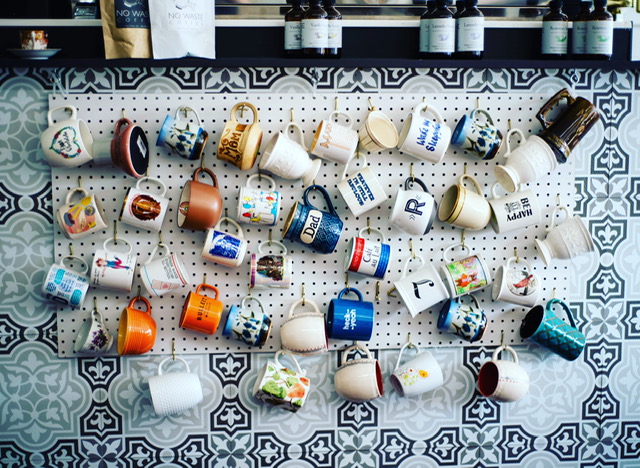The Local newsletter is your free, daily guide to life in Colorado. For locals, by locals.
Growing up, Saturday mornings in Patricia Acheson’s household were not for eating banana pancakes or watching reruns of Saved by the Bell. They were for early rise outings to local garage sales. “We’d find a lot of our furniture there for our bedrooms and whatnot, and then we would spray paint it and give it new life,” says Acheson, owner of Fox Den No Waste Cafe and Roastery in Fort Collins, remembering when she and her mom scored a ratty, wicker, four-piece bedroom set for $40. At age eight, her outlook on life changed after reviving the furniture with a fresh coat of white paint. “That was my first realization of how we could turn something old and weathered into something beautiful,” she says.
For the past year, Acheson has been putting her deeply instilled penchant for sustainable practices like upcycling—not to mention her experience as a coffee roaster—to good use as she prepared to open her first retail coffee location. In March, the Fox Den No Waste Cafe and Roastery welcomed customers into what is one of the first U.S. coffee shops to completely eliminate single-use disposables like to-go cups and napkins, according to Acheson’s research. “And I escalated from there,” she says, adding “everything in my shop has been either upcycled, found at an estate sale or on Facebook Marketplace, or it was leftover materials. Nothing was bought new unless the health department required me to buy it new.”

Acheson has been roasting coffee professionally since 2019, but she had always dreamed of opening her own retail coffee spot. Upon moving to Fort Collins in July 2021, she decided the time and place were finally right. There was just one last barrier standing in her way: the waste and expense of buying single-use materials. “It just drove me crazy knowing that I was buying products over and over and over again just to throw them away after using them for 20 minutes,” she says. “No matter if you try and recycle them; they most likely get tossed in a landfill anyway. That was a huge eye-opening thing for me.”

So Acheson decided to do things differently. Customers can wander over to the wall of mugs—an eclectic collection salvaged from thrift stores and donated by community members—and select from coffee conduits featuring flowered hearts, teal geometrics, and “Dad” emblazoned on the side. Those taking their java on the run should either remember to bring in their own mug or plan to put a $1–$1.50 deposit down (depending on the type of drink) on a glass to-go jar. (Customers can return the jar and get the deposit back.) The cafe serves baked goods from its partners at I d’ Éclair Pastry on fabric scraps left over from local artist projects.

The furniture, of course, lives into the cafe’s no-waste credo as well. Laundry-folding tables inherited when Acheson purchased the building (formerly a laundromat) have been sanded, spray painted, and turned into retail shelves. When the old soap vending machine couldn’t be removed, Acheson added shelves and fashioned it into a free, mini library. Old Victorian furniture purchased in an estate sale became customer seating. “When I look around, I don’t just see a couch,” she says. “I see this woman’s mother’s couch, and she sat there all night and would knit their clothes when they were growing up. I see the stories behind the furniture. It’s humbling.”

Acheson’s sustainability-focused efforts continue on the back end of her business with carbon offsets for all of their emissions, composting all coffee grounds, and partnerships with Fair Trade–, organic-, and Rainforest Alliance–certified coffee growers. The shop also make its syrups in-house (essential for eliminating waste from additional containers) and will begin making its own oat milk any day now. “I better get this recipe down quick or else I might be a single woman!” Acheson jokes, noting she’s been saving all the oat milk containers in her garage for the past three months, determined to find a way to reuse them—much to her fiancé’s chagrin.
Thanks to all these efforts, Fox Den has no bags of actual waste when it shutters at the end of the day—just a small bag of compostable food scraps (most of which go to a local farm) and some recyclables.
There’s no doubt Acheson is proud of the no-waste niche she’s carved, but she hopes the idea will eventually extend beyond Fox Den. “My goal here is not to be the only no-waste shop in town,” she says. “It’s to inspire other companies, start-ups, and restaurants to have roughly the same business model.”










